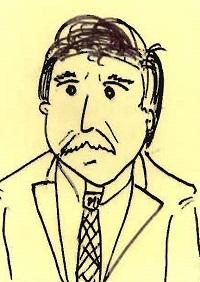VII - Billy Hughes
William Morris "Billy" Hughes was a wiley political character who was described by his opponents as a spider, a rat and a crab. He was a political journeyman who would go on to be a member of six diffent political parties, be expelled from three of them; represent four different electorates and in two states.
Before federation, he had been secretary of the Wharf Labourer's Union, first national president of the Waterside Workers' Union and eventually during the formalisation of the Labor Party would become part of the federal party.
After Andrew Fisher's health had declined and he resigned, Hughes was appointed as his successor and followed on in that same policy style; enacting legislation including an improved pension for elderly people in benevolent asylums.
Hughes and the Labor Party disagreed violently over the issue of conscription and in October of 1916 a plebiscite was held on the issue - it failed.
The disagreement was so heated that following the plebiscite, in November of 1916, Hughes was expelled and 24 member of the Labor Party followed him to form the National Labor Party although it was never formally constituted and had no structure to speak of.
For the 1917 budget, it would depend on member of the Commonwealth Liberal Party for supply they formally merged to form the Nationalist Party of Australia.
As the Nationalist Party Prime Minister, Hughes would oversee the end of the war and attend the Paris peace conference of 1919. Legend has it that during the peace conference, when negotiating repatriations that Germany was expected to pay, if Hughes didn't like what was being said, he claimed that his hearing aid wasn't working.
Hughes signed the Treaty of Versailles and asked of the then United States' President Woodrow Wilson: "I speak for 60,000 dead, How many do you speak for?" Wilson would later declare that Hughes was a "pestiferous varmint".
Hughes also demanded that Australia have representation independent of Britain in the League of Nations, however he was opposed to Japan's request for racial equality in the organisation.
Hughes would also be instrumental in Australia's taking up of preferential voting and although the governments he led would win the 1917 and 1919 elections, the 1922 election was only finally won with the help of entering into a coalition with the Country Party; a coalition which in broad principles still exists today. In February of 1923, the Country Party leader Earle Page made his intentions clear that the coalition with Hughes as Prime Minister was untennable and rather than risk government, Hughes resigned in favour of Stanley Bruce.
Hughes would remain a member of Parliament and would change parties again, being a member of the United Australia Party and finally the Liberal Party until his death in October 1952. He was the last member to have remained from the first parliament and at 90 years old, the oldest member of an Australian parliament ever.
Aside:
The Gillette Safety Razor was awarded a patent in 1904 but it wasn't until during WW1 that Gillette won a contract to supply American soldiers that they really took off. Schick's single edge razor was developed in the 1920s and things took off from there.
The reason I mention this is that Billy Hughes was the last PM with a moustache. One wonders if the widespread use of the razor is a coincidence or not.


No comments:
Post a Comment